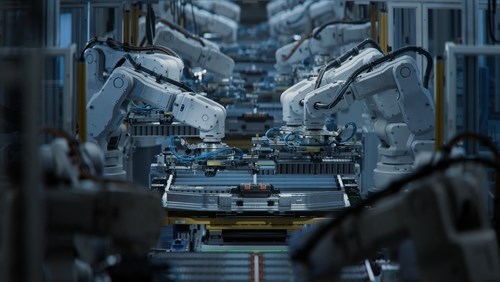
SCANOLOGY has just introduced NimbleTrack Gen2. With upgraded technology, SCANOLOGY's NimbleTrack Gen2 is capable of scanning large and complex areas significantly faster, while maintaining measurement-level accuracy. This is the next generation of the company's mobile optical tracking and 3D scanning systems. SCANOLOGY's NimbleTrack Gen2 is designed to deliver higher performance, especially in speed and measurement range.

A breakthrough opportunity for R&D processes awaits the Vietnamese engineering community. The specialized workshop "Driving Engineering Innovation Through Smart Simulation" organized by ANSYS will take place on October 29, 2025, at the Innovation Hub Building, updating the latest advanced simulation solutions for the manufacturing, electronics design, and Nano-Micro industries.

In the global race to automate manufacturing, China is emerging as a pioneer with the “dark factory” model – where robots and artificial intelligence completely replace humans. Requiring no light or rest, the new generation of factories operate continuously 24/7 with superior precision and efficiency.
Let's explore V-Proud's article to gain a deeper understanding of the benefits, applications, and processing techniques related to sheet metal in the automotive industry. We are always ready to support you in achieving optimal results in your projects.
In the automotive manufacturing industry, sheet metal is an indispensable element. All procurement and supply chain experts in the automotive market clearly understand the fundamental importance of high-quality sheet metal.
Selecting from the many options available and having a clear understanding of the different materials used in car manufacturing can be a challenge.
Sheet metal is the preferred choice for various automotive applications due to its outstanding advantages. Whether you are designing a new vehicle or modifying an existing one, the benefits of using sheet metal are significant:
High Precision
Design Freedom
Material Diversity
Reduced Vehicle Weight
Cost-Effectiveness
Aluminum sheet is widely used in vehicle structures. From the car body (Body-in-White - BIW) to the chassis, structural reinforcement parts, and body panels, sheet metal is a crucial material that provides strength, durability, and aesthetics.
Body and Chassis
Structural Components
Body Panels
Design engineers have many different material options, and the selection of the appropriate material can be based on varying levels of strength, corrosion resistance, and formability. Popular choices include carbon steel, aluminum, and stainless steel.
Material Options (Steel, Aluminum, Stainless Steel)
Thickness (Gauge)
Surface Finish
Vehicle structures require many different types of sheet metal to achieve the desired strength, durability, and aesthetics. At Kloeckner Metals, we offer a wide selection of high-quality sheet metal specifically designed for automotive applications. Explore some of the top choices:
Aluminum
Stainless Steel
Cold-Rolled Steel
Galvanized Steel
Dual-Phase Steel
Martensitic Steel
Aluminum has become an essential material in the automotive industry due to its lightweight, strength, and corrosion resistance. Let's delve deeper into the applications of aluminum and aluminum alloys used for various automotive applications.
Alloy 1100
Alloys 3003 and 3004
Another significant difficulty in the field of sheet metal processing is ensuring the supply of standard materials. Good sheet metal materials must be free from defects such as cracks, porosity, or deformation, as these can weaken the strength of the product. To ensure material quality, choosing a reputable supplier is very important.
Sheet metal processing is a collection of techniques used by the automotive industry to create complex and high-quality car parts. In addition to mastering these processes, you need a sheet metal processing service focused on quality.
CONTACT V-PROUD TODAY FOR CONSULTATION AND QUALITY CONTROL SOLUTIONS IN THE SHEET METAL MANUFACTURING INDUSTRY.
V-PROUD JOINT STOCK COMPANY
Address: Lot A-23 Xuan Phuong Garden, Phuong Canh Ward, Nam Tu Liem District, Hanoi
Hotline: 0896 665 247
Email: xinchao@v-proud.vn
(84) 896 555 247